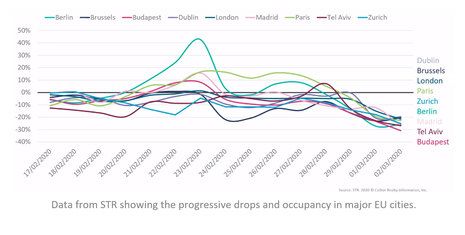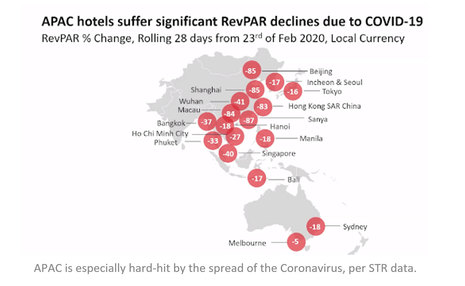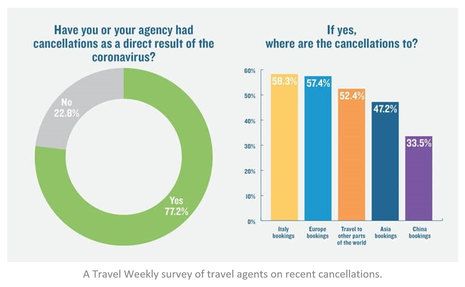



Make no mistake: the global spread of the novel coronavirus, or COVID-19, is a tragedy and health crisis. Successful containment and prevention requires close collaboration between business, government, and the public.
With that being said, the travel industry faces unprecedented headwinds. Hotel occupancy is down in many regions, dwindling to the single digits in especially hard-hit cities like Hong Kong. On the heels of the cancellation of major events such as ITB in Berlin and the Mobile World Congress in Barcelona, and amidst the growing outbreak in Italy, occupancy has dipped by double digits in most major cities in the EU.
It's hard to measure the total impact of the virus on the economy. Globally, the impact could reach $1.1 trillion by one estimate. In the EU, the government estimates that the virus is costing the EU's travel industry an estimated Euro 1 billion per month. In China, the epicenter of the outbreak, growth will likely fall below 5% this year — the weakest growth rate in over 30 years. Other APAC economies are already experiencing cancelled events and fewer arrivals from both Chinese and international travelers.
These are challenging times for the travel and hospitality industries. Crisis is an inevitable part of the hotel business, from the current pandemic to managing natural disasters. In any crisis, it's important to carefully consider what needs to be done to maintain some level of confidence and preserve competitiveness for the eventual recovery. Here are four steps that you should take right now so that you're prepared when crisis comes to your city.
Your staff are on the front lines of this epidemic. They are the ones who are at risk by interacting with guests and they are the ones who can also make guests feel comfortable and provide a memorable guest experience in uncertain times. So it's imperative to start with your staff! You want them to be both informed and prepared to respond to guest concerns consistently and with a single voice.
Uncertainty causes fear and fear is never good! Assure your staff with open communications, consistent messaging and clear procedures. Remember that they are also going through a stressful time, both from a personal health perspective and a professional "am I going to lose my job?" perspective.
It's always tempting to ignore the elephant in the room. But, by not addressing the crisis head-on, you leave guests to make up their own narratives. In times of crisis, transparency is key!
Throughout each interaction, be considerate and empathetic to everyone's concerns. The point is to avoid panic by being transparent, responsive and responsible. Yes, this is a very fine line. But you need to walk that line carefully and with intention!
To avoid the risks of infection (or being quarantined at some point during their trip), many travelers are hesitant to travel on airplanes. And, even if they wanted to travel, airlines are dramatically reducing schedules. Your marketing must adapt and target segments most likely to book at your hotel. In the case of a public health crisis, this usually means short-haul travelers and those within driving distance of your property.
It's always tempting to follow competitors in a race to the bottom, especially in times of panic-driven downturns. The smart move is to bring together revenue and marketing to craft a cohesive strategy that uses both pricing and marketing to minimize losses and maximize opportunities. Each crisis has its own specifics, so you'll adapt your segments accordingly as your team identifies the bright spots and leans into those opportunities.
Hotels that successfully navigate these uncertain, uncharted waters have one thing in common: creativity. They're able to think outside the box and pursue opportunities that may not be readily apparent to others.
They also think local. Even if a crisis originates abroad, the impact is felt locally. Engage your staff and brainstorm activities to help boost the local economy and nurture community spirit. No idea is too bold, so encourage out-of-the-box thinking and build on each idea to create new and unexpected opportunities for your hotel.
Some ideas on how to think creatively to capitalize on other means to engage business:
Beyond the benefits of collaborating locally, these efforts also position your brand as a leader in times of crisis. How we act — or don't act — is always remembered by consumers. It may not feel like it now but perception is key for how your hotel performs once the crisis passes. These activities are important to share externally because people look closely at how business and brands operate in times of crisis.
One thing's for certain: COVID-19 won't be the last crisis facing the industry. And we're definitely at a "new normal" in which global awareness around pandemics is now well established. Regardless of the type of crisis, all of the advice about stands. It's all about planning and preparation, both done in advance of any crisis. As you look ahead to the next crisis, use your learnings from COVID-19 and either create new contingency plans, or update existing ones to make sure they are the most relevant and useful.
Once these plans are formalized, share them with staff and schedule trainings. You want everyone on the same page, and prepared for whatever may come their way — especially with crises that require rapid responses, such as terrorism or super-contagious pandemics.
Advance preparation often separates those who make it through a crisis relatively unscathed and those that struggle. For more on protecting your hotel, here's how to get started with a proper crisis management plan.
Contact
Nicki Graham
VP, Marketing
Mobile: +44 208 683 195
Email: ngraham@cendyn.com
Organization
Cendyn™
https://www.cendyn.com/
301 Yamato Rd, Ste 3194
USA
- Boca Raton, FL 33431
Phone: 1-561-515-6276
Email: info@cendyn.com
Recent News
 testing do not publish testing do not publish |
 2026 is the year of MCP: what hoteliers need to know 2026 is the year of MCP: what hoteliers need to know |
 this is a test this is a test |